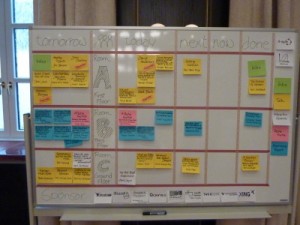Last evening I talked with my husband about common problems with team building and communication and I noticed a familiar theme: There is a common and widely spread misconception that just because people are sitting in the same office they are communicating effectively. Unfortunately, this simply is not the case. And it’s not even because they are not talking. Most of the time they just are not talking about the „right“ stuff.
I put „right“ in quotation marks because I do not think that co-workers are usually only talking about useless things. What they are talking about might very well be justified and well chosen.
The original starting point for this discussion was the question whether short daily stand-up meetings are useful. I am very convinced that they are. I think a daily stand-up meeting should be some manager’s ultimate weapon of choice to discover (and hopefully fix) problems early and facilitating teamwork and communication.
What the manager might say is: „Well, we don’t need daily stand-ups. The whole team is sitting together in one office anyway. So if someone has a problem they can just go right ahead and address it.“
Here’s the thing: This only works for the tip of the iceberg problems that somehow make themselves visible to the team. What you need to know about to make the team more effective are the problems that form the underwater part of the iceberg that you haven’t even seen yet.
In my software development team I work together with another developer. We sit in the office. Our desks face each other. We also talk. Sometimes a lot. But we still miss problems or opportunities to work more effectively. Every so often it turns out that I was working on something that he already had fixed or at least researched halfway. Or one of us was trying to solve a problem to which the other one already knew the answer or at least knew where to look for the answer.
The thing is that you usually don’t bother your colleague with what you’re currently doing all the time. You get something to work on, you dive in, you are hopeful that you can find a solution. In short, you don’t really need their help. And you don’t want to bother your team with your problems (which seem solvable) while they themselves are busy with their own tasks.
Here’s another exmaple: We have a weekly phone call scheduled with some developers in Denmark with whom we work together. Sometimes we have an agenda of things we need to talk about. Sometimes we have little things. Sometimes they have updates for us. Last week my team lead, my colleague and me pretty much had nothing. The developers in Denmark also sounded like they didn’t have a lot. Still, somehow, the phone call took nearly 30 minutes, because someone said something, to which someone else replied, which raised new questions which turned into a long description and discussion. Yeah. It felt like we had nothing really to say. But it turned out that we did.
Daily stand-ups will help you find and fix problems before they even have the chance to become full-grown problems. If everyone will just say what they are doing currently and sometimes what they are struggling with, you will find issues where nobody really expected them to start with. You will find out when two people are actually working on the same thing. You will find out when someone is misunderstanding a task. You will find out if there’s someone who actually knows the solution to a problem someone else is struggling with. You will find out when there are obstacles that you weren’t even aware of. You will find out lots of things and will be able to fix problems quickly and find ways for the team to work together even better.
And don’t underestimate the power of curiousity. That stupid thing you’re working at that you can’t even look at anymore might just spark the interest of someone else who will eagerly volunteer to help you. I remember a bug we found regarding different handling of spaces before exclamation and question marks which a developer who was a linguistics enthusiast practically jumped to grab. (This didn’t happen in a daily stand-up, but it shows how different members of a team might enjoy to work on different tasks.)
My advice would be: When in doubt, try daily stand-ups. And when are we ever not at least slightly in doubt?
